- Membership & Community
-
Publications & News
- Journals
-
Newsroom
-
The Physiologist Magazine
- 2019
- 2020
- 2021
- 2022
- 2023
- 2024
- In Depth
-
Mentoring Forum
- Net Worth
- Take Care
- You … In Charge
- Work. It. Out.
- Working Off-site
- Location, Location, Location?
- Student Support
- Progressing to Postdoc
- Relationship Building
- Let’s Get It Started
- What Do We Value?
- It’s a Postdoc Life
- Coronavirus Contributions
- Creative Communications
- Selection Process
- Conference Connections
- Postdoc Appreciation
- Research Rewards
- Focus on Teaching
- Industry Insights
- Balance Beam
- Post Postdoc
- If You Build It
- Talk It Through
- Forward Bound
- I’ve Earned My PhD. Now What?
- University Life
- Tips for Trainees
- Time Travel
- Prepare Now for the Career You Want
- Policy IQ
- Publish with Polish
- Under the Microscope
- Mentoring Q&A
- The Physiologist Magazine Readers Survey
- Evolution
- Baseline by Scott Steen, CAE, FASAE
- Find Us on Social Media
-
The Physiologist Magazine
-
Professional Development
-
Meetings & Events
-
American Physiology Summit
- #APS2024 Overview
- Abstracts
- Awards at the Summit
- Award Lectures
- Career Networking Lunch Form
- Dates and Deadlines
- Hotel Information
- Industry Partners
- Keynote Speaker—Brian Kobilka, MD
- Keynote Speaker—Jessica Meir, PhD
- Mobile App
- NIH and NSF Program Officer Panel Discussion Form
- Off-site Summit Meetups
- Physical Poster Information
- PhysioHub
- Pre-Summit Events
- Registration
- Section & Group Banquet Tickets
- Speaker Audiovisual Instructions
- Summit FAQs
- Summit Newsroom
- Summit Store
- Travel & Transportation
- Undergraduate Program Book
- Liability Waiver
- Summit Call for Proposals
- Industry Partners
- Martin Frank Diversity Travel Award Orientation Agenda
- Martin Frank Diversity Travel Award Networking Luncheon Agenda
- Women in Physiology Networking Event Agenda
-
2023
- APS 2023 Call for Proposals
- Shocklogic Test
- Team 2023 Task Force
- Shaping the Summit
- Schedule at a Glance
- Pre-Summit Events
- Pre-Summit Center for Physiology Education Workshop Registration
- Section & Groups Banquet Tickets
- Summit Store
- Pre-Summit Center for Physiology Education Workshop
- Press Registration
- Meet the Organizers
- Keynote Speaker—Terrie Williams, PhD
- Keynote Speaker—David Julius, PhD
- Industry Workshop Information
- Important Dates and Deadlines
- Hotel Information
- Game Changers
- Distinguished Lecturers
- Building APS 2023
- Awards at the Summit
- 2023 Summit Information
- American Physiology Summit Program
- 2023 Summit Newsroom
- 2024
- Scientific Integrity Policy
- Integrative Physiology of Exercise Conference
- From Concept to Classroom
- Webinars
- Related Meetings
- Future APS Conferences
-
Past APS Conferences
- APS Institute on Teaching and Learning
- Integrative Physiology of Exercise
- Seventeenth International Conference on Endothelin (ET-17)
- New Trends in Sex and Gender Medicine
- APS Institute on Teaching and Learning (2022)
- Control of Renal Function in Health and Disease Conference
- Comparative Physiology: From Organisms to Omics in an Uncertain World
- Conference Policies
-
American Physiology Summit
- Awards
-
Career & Professional Development
-
Career Gateway
-
Resources
- Transcript—Leading Through Conflict and Difficult Conversations
- Transcript—Managing Conflict with Colleagues
- Transcript—Leading a Team Through Conflict
- Transcript—Providing Difficult Feedback
- Transcript—Team Dynamics and Culture Primer
- Transcript—Building a Team
- Transcript—Leading a Team Assigned to You
- Transcript—Creating a Team Culture
-
Resources
- Career Navigator
- Center for Physiology Education
- Job Board
- Mentoring
- APS Graduate Physiology & Biomedical Science Catalog
-
Career Gateway
-
Meetings & Events
-
Advocacy & Resources
- Policy Areas
-
Resources
- Researcher Resources
- Educator Resources
- Trainee Resources
- Student Resources
-
APS Graduate Physiology & Biomedical Science Catalog
- Augusta University
- Des Moines University
- East Tennessee State University
- George Washington University
- Louisiana State University Health Sciences Center Shreveport
- Mayo Clinic Graduate School of Biomedical Sciences—Biomedical Engineering & Physiology
- Medical College of Wisconsin
- Michigan State University
- New York Medical College
- Nova Southeastern University
- Pennsylvania State University
- Saint Louis University
- Texas A&M University
- Texas A&M University Medical Physiology
- Stony Brook University
- The University of Iowa
- The University of Mississippi Medical Center
- University of Alabama at Birmingham
- University at Buffalo
- University of Colorado
- University of Delaware
- University of Florida
- University of Louisville
- University of Michigan
- University of Minnesota
- University of Missouri-Biomedical Sciences
- University of Nebraska Medical Center
- University of Oregon
- University of South Carolina School of Medicine
- University of Tennessee Health Science Center (UTHSC)
- University of Texas Health Science Center
- Virginia Commonwealth University
- Wayne State University
- Wake Forest University
- Physiology Department Catalog Submission Form
- Career Gateway
- Diversity, Equity & Inclusion
- Advocacy
- About APS
Rockville, Md. (April 7, 2023)—The American Physiological Society (APS) is pleased to announce its new member leaders for 2024–2025: President Timothy Musch, PhD, FAPS, FACSM; President-elect Robert L. Hester, PhD, FAPS; and Councilors Patricia A. Halpin, PhD, FAPS; My Helms, PhD; and Beth A. McCormick, PhD. The new officers were elected by APS membership and took office April 7, 2024, at the American Physiology Summit, APS’ flagship annual meeting, in Long Beach, California.
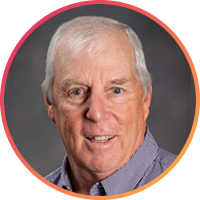 Timothy Musch, PhD, FAPS, FACSM, is a University Distinguished Professor in the Departments of Kinesiology and Anatomy & Physiology at Kansas State University. Musch’s service to the Society includes prior roles as Councilor, chair of the Animal Care & Experimentation Committee and the Committee on Committees, and as a member of the Public Affairs, Education, Fellows, Membership, Nominating, Section Advisory and Strategic Planning committees. He is on the editorial boards of the Journal of Applied Physiology and the American Journal of Physiology-Heart and Circulatory Physiology. Musch was the Guyton Educator of the Year in 2013 and received Fellow of the American Physiological Society (FAPS) status in 2016.
Timothy Musch, PhD, FAPS, FACSM, is a University Distinguished Professor in the Departments of Kinesiology and Anatomy & Physiology at Kansas State University. Musch’s service to the Society includes prior roles as Councilor, chair of the Animal Care & Experimentation Committee and the Committee on Committees, and as a member of the Public Affairs, Education, Fellows, Membership, Nominating, Section Advisory and Strategic Planning committees. He is on the editorial boards of the Journal of Applied Physiology and the American Journal of Physiology-Heart and Circulatory Physiology. Musch was the Guyton Educator of the Year in 2013 and received Fellow of the American Physiological Society (FAPS) status in 2016.
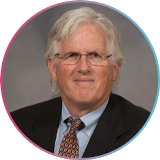
Robert L. Hester, PhD, FAPS, is the Billy S. Guyton Distinguished Professor and a professor of physiology at the University of Mississippi Medical Center. Hester has served APS as past chair of Joint Programming Committee and the Cardiovascular Section. He has been a member of the Section Advisory, Education and Science Policy committees, the American Physiology Summit 2023 Task Force, and was chair of the Experimental Biology Board. Hester is an associate editor of the American Journal of Physiology-Heart and Circulatory and a section editor of Comprehensive Physiology. His current research is focused on computer simulation of integrative physiology. Hester received FAPS status in 2015.
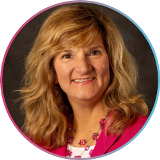
Patricia A. Halpin, PhD, FAPS, is a professor of biology and biotechnology at the University of New Hampshire. She was trained as a renal physiologist and is now an education researcher. Halpin has been a member of APS since 1995. She serves on the Center for Physiology Education advisory board. Halpin is also a member and past chair of the Teaching of Physiology Section. An early adopter of online learning, she uses face-to-face, online and blended modalities to teach a variety of courses. Halpin received FAPS status in 2024.
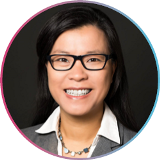
My Helms, PhD, is an associate professor with tenure at the University of Utah pursuing mechanistic studies in epithelial transport biology. She is chair of the Cell and Molecular Physiology Section Postdoctoral Review Committee. Helms is also a member of Cell Section’s Research Host Contact List, Social Media Admins and Summit-CAMPS committees. She is the past chair of the Cell & Molecular Physiology Section Steering Committee. Helms mentors the next generation of scientists to become independent investigators. She addresses the scientific challenges and opportunities of our time through university and APS service.
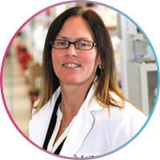
Beth A. McCormick, PhD, is a professor and chair of the Department of Microbiology and Physiological Systems at UMass Chan Medical School. McCormick is an internationally renowned gastrointestinal physiologist and has been an active participant in APS activities for nearly 20 years. She has served as secretary-treasurer of the APS Gastrointestinal & Liver Section (2018–2021),an editorial board member for the American Journal of Physiology-Gastrointestinal and Liver Physiology and an organizer of plenary sessions. She was the 2023 Gastrointestinal & Liver Physiology Section Distinguished Lecturer. McCormick has served as a session chair at Experimental Biology as well.
NOTE TO JOURNALISTS: To schedule an interview with a member of the research team, please contact APS Media Relations or call 301.634.7314. Find more research highlights in our Newsroom
Physiology is a broad area of scientific inquiry that focuses on how molecules, cells, tissues and organs function in health and disease. The American Physiological Society connects a global, multidisciplinary community of more than 10,000 biomedical scientists and educators as part of its mission to advance scientific discovery, understand life and improve health. The Society drives collaboration and spotlights scientific discoveries through its 16 scholarly journals and programming that support researchers and educators in their work.
Related Content
- Blood Flow-restricted Resistance Exercise Could Help Counteract Age-related Muscle Loss
- APS Recognized with Marketing and Communications Awards
- Nobel Laureate and Wildlife Ecophysiologist to Speak at American Physiology Summit
- Diabetes Drug Could Aid Recovery from Bouts of Food Insecurity or Anorexia
- Alcohol Abuse Increases Sensitivity of Coronavirus Infection
- Changing Dosing Methods Means Fewer Mice Needed to Study Lung Infections
- Healing after Muscle Injury Depends on Biological Sex
Contact Us
For questions, comments or to share your story ideas, email us or call 301.634.7314.

